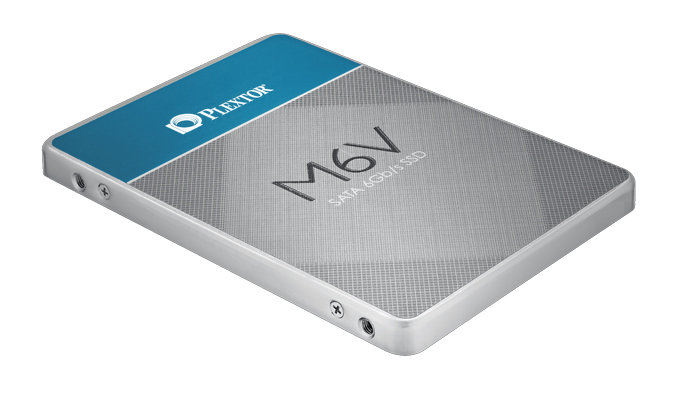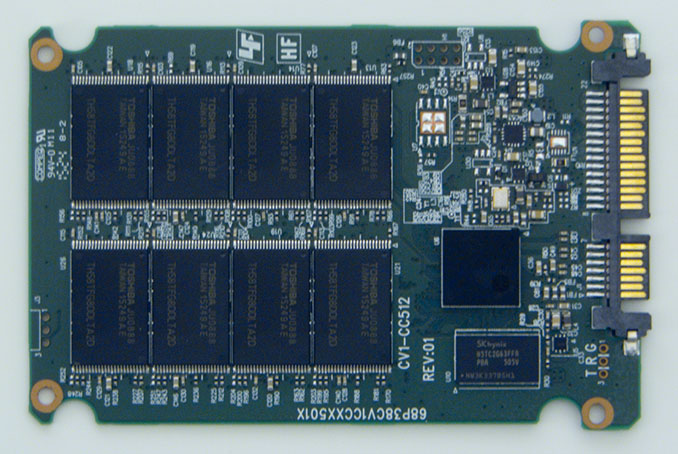The Plextor M6V (256GB) SSD Review
by Billy Tallis on October 12, 2015 8:00 AM EST
Plextor's M6V SSD was originally planned to be their first drive using TLC NAND, but that has now been put off to next year's M7V. Instead, Plextor is taking advantage of a surprise hit in the SSD controller market, Silicon Motion's SM2246EN controller. We've previously tested this controller in the ADATA Premier SP610, the Transcend SSD 370, the Mushkin Reactor, and the Crucial BX100. The SM2246EN was designed to be a low-power controller for low-cost drives, and it has been very successful in that segment. The controller doesn't support TLC NAND, so all of these drives are free of the higher power consumption and lower performance that have troubled low-end TLC solutions we've seen so far.
| SM2246EN SSDs | ||
| Drive | NAND | Capacites |
| ADATA Premier SP610 | Micron 128Gbit 20nm MLC | 128GB, 256GB, 512GB, 1TB |
| Transcend SSD 370 | Micron 128Gbit 20nm MLC | 32GB, 64GB, 128GB, 256GB, 512GB, 1TB |
| Mushkin Reactor | Micron 128Gbit 16nm MLC | 256GB, 512GB, 1TB |
| Crucial BX100 | Micron 128Gbit 16nm MLC | 120GB, 250GB, 500GB, 1TB |
| Plextor M6V | Toshiba 128Gbit 15nm MLC | 128GB, 256GB, 512GB |
The SM2246EN has been paired with a variety of NAND, so these drives don't all perform identically. The Plextor M6V is the first time we've seen this controller paired with Toshiba's 15nm MLC, which is significantly denser than Micron's planar NAND and competitive with Samsung's second generation V-NAND. Toshiba has had trouble getting the 15nm MLC out the door in large quantities, and the rest of Plextor's products are still using Toshiba 19nm or A19nm MLC.
Of the major SM2246EN drives, each one differs a bit from the others in terms of features. Transcend's SSD 370 and its aluminum-clad variant (the SSD 370S) use custom firmware to offer encryption, but is missing some power saving modes. Mushkin's Reactor was initially available only in the 1TB capacity, but the 512GB and 256GB models are now available from some retailers. Crucial's BX100 uses semi-custom firmware and features the partial power loss protection now typical of their mainstream drives. The Plextor M6V, by comparison, has just the basic feature set of a SM2246EN drive, augmented only by Plextor's PlexTurbo RAM caching software for Windows (but not Windows 10).
Plextor has opted to not make a 1TB version of the M6V, which would probably require more expensive packaging to fit on the PCB layout they're using. Our 256GB sample has 8 packages on front of the PCB and 8 empty pads on the back, which means that each package has two 128Gbit dies inside.
| Plextor M6V SSD Specifications | |||
| Size | 128GB | 256GB | 512GB |
| Controller | Silicon Motion SM2246EN | ||
| NAND | Toshiba 15nm Toggle MLC | ||
| DRAM Cache | 128 MB | 256 MB | 512 MB |
| Sequential Read | 535 MB/s | 535 MB/s | 535 MB/s |
| Sequential Write | 170 MB/s | 335 MB/s | 455 MB/s |
| 4kB Random Read | 81k IOPS | 83k IOPS | 83k IOPS |
| 4kB Random Write | 42k IOPS | 80k IOPS | 80k IOPS |
| Warranty | 3 years | ||
The M6V also has siblings in smaller form factors: the M6MV (mSATA) and M6GV (M.2 SATA), both using the same controller and flash as the M6V. They shouldn't be confused with the M6M and M6G, Plextor's higher-performance mSATA and M.2 SATA drives, which like the rest of Plextor's SSDs use Marvell controllers and 19nm Toshiba flash. The M6MV doesn't have a 512GB configuration, but the M6GV does. Both of the smaller form factors use more expensive and denser BGA packaging for the NAND flash, and neither seems to be readily available for purchase yet.
| AnandTech 2015 SSD Test System | |
| CPU | Intel Core i7-4770K running at 3.5GHz (Turbo & EIST enabled, C-states disabled) |
| Motherboard | ASUS Z97 Deluxe (BIOS 2401) |
| Chipset | Intel Z97 |
| Chipset Drivers | Intel 10.0.24+ Intel RST 13.2.4.1000 |
| Memory | Corsair Vengeance DDR3-1866 2x8GB (9-10-9-27 2T) |
| Graphics | Intel HD Graphics 4600 |
| Graphics Drivers | 15.33.8.64.3345 |
| Desktop Resolution | 1920 x 1200 |
| OS | Windows 8.1 x64 |
- Thanks to Intel for the Core i7-4770K CPU
- Thanks to ASUS for the Z97 Deluxe motherboard
- Thanks to Corsair for the Vengeance 16GB DDR3-1866 DRAM kit, RM750 power supply, and Hydro H60 CPU cooler











51 Comments
View All Comments
StrangerGuy - Monday, October 12, 2015 - link
Yet another new SSD article on AT that ends up showing how it gets destroyed by Samsung in overall specs/price.franz899 - Monday, October 12, 2015 - link
Actually the Crucial BX100 is a better choice looking at the scores.medi03 - Monday, October 12, 2015 - link
Nope, not to note it isn't even present on many screens and MX200 is a different product.SmokingCrop - Tuesday, October 13, 2015 - link
The BX series is better bang for the buck, you won't notice the speed difference with the popular samsung drives.salimbest83 - Wednesday, October 14, 2015 - link
im shopping for new 240GB+ ssd. looks like BX100 is the way to go rite?Billie Boyd - Friday, November 27, 2015 - link
I rather go with AMD Radeon R7 series. Its one of the highly rated high drives in the market (see http://www.consumerrunner.com/top-10-best-hard-dri... for example)emn13 - Tuesday, October 13, 2015 - link
Assuming this is a low-end drive i.e. cheaper than the 850 pro, it looks like it outperforms the 850 evo mSata pretty much across the board, getting close to crucial's BX100.FriendlyUser - Tuesday, October 13, 2015 - link
As an owner of 2x840 EVO and 2xPlextor, I can tell you the Samsung's bug was a major disappointment. Read performance after months simply sucks and I had to patch the firmware 2-3 times and regularly "manually" freshen the data with the samsung tool. I have way more confidence in the Plextor firmware. Never again Samsung.AnnonymousCoward - Friday, October 16, 2015 - link
...yet another SSD article on AT that focuses on the pointlessness of non-real world benchmarks. Readers will leave this article without having a clue what boot time differences to expect between drives, or any other metric. I've been saying this for years. HardOCP finally caught on. http://tinyurl.com/pvyzmaudj_aris - Monday, October 12, 2015 - link
What is the purpose of reviewing SATA SSD drives? Anyone in the market for a drive should either buy a spinning HDD for storage or a PCIe for speed.